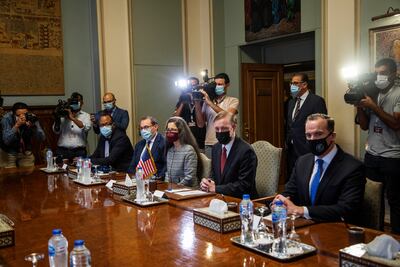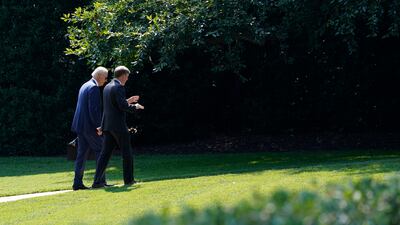The Biden administration seems to be forging a new path in the Middle East at a time when its credibility has been damaged by the chaotic withdrawal of US-led forces from Afghanistan in August.
US military officials have blamed the administration at recent Congressional hearings for the mess in Afghanistan. Opposition leaders in the Republican Party have called for the resignations of President Joe Biden, Secretary of State Antony Blinken and National Security Adviser Jake Sullivan. All this has coincided with Mr Sullivan’s visit to the region last week to discuss the nature of the US’s strategic relations with the Arab states, even as Washington continues to pursue renegotiations with Iran over their 2015 nuclear deal.
And now, it seems, a new season of bargaining and dealmaking has begun.
During his visit, Mr Sullivan essentially conveyed to the region's leaders Mr Biden’s desire to review American policy in the Middle East in light of two key developments: the reduction of US troops in the region, and the anticipated revival of the JCPOA – as the original nuclear deal with Iran is called – followed by an end to the US sanctions regime against Tehran.

The Biden administration seeks to shift the US's role in the region from military “big brother” to that of “diplomatic partner” on major issues, including security in its broader meaning. Mr Biden is also looking to polish his image – and that of America’s – after the Afghanistan withdrawal. Work to unveil a roadmap to this end in two to three weeks – in time for the G20 summit in Rome later this month – has begun in earnest.
The Biden administration does not seek to build alliances against Iran and its regional projects. It is merely interested in drawing some red lines. It is not interested in blocking Iranian expansionism but simply limiting it. It is endorsing the European position vis-a-vis Iran that, as I had written in my previous column, is based on persuading the regime to refrain from supporting terrorism or acting in ways that could lead to refugee waves towards Europe. Indeed, the US is following in the steps of its European allies, as it approaches Tehran with a policy of peaceful coexistence and non-intervention in its expansionist policies – so long as three conditions are met: Israel’s security, its own freedom of navigation, and Iran’s de-nuclearisation.
The European relationship with Iran has traditionally been distinctive, especially when Germany shapes and leads it. With Chancellor Angela Merkel remaining in office until the end of the year, the Biden administration believes there is an opportunity to cement this new approach towards American-European-Iranian relations.
For the Biden team, positive relations with Europe are a foreign policy priority. Appeasing the Europeans is crucial, particularly as they will have a crucial role to play in the US’s approach towards a rising China in the years to come.

America's diplomatic outreach in the Middle East could well begin with the conflict in Yemen. In fact, it was no coincidence that accompanying Mr Sullivan to Saudi Arabia last week was the US envoy to Yemen, Tim Lenderking.
Ending the war in that country could perhaps even be part a grand bargain, if the US, Russia and Europe can force Iran to stop its meddlesome activities there. Riyadh is keen for the war to end in neighbouring Yemen, for which it needs American, Russian, European and UN backing. However, given its support of the rebel Houthis, Iran needs to co-operate as well.
So far, it is unclear whether a deal is in the making. But Russia, it is believed, is involved in helping broker one. Moscow, meanwhile, is reportedly in talks to let Washington use its military bases in Central Asia for the latter to be able to hit terror targets in Taliban-ruled Afghanistan. In return for all this, the Russians are seeking American recognition of the Assad regime in Syria.
Will the new American plan based on diplomacy, bereft of military confrontation, be the way to contain the region’s great wars and guide it towards normalisation? Or will Washington’s ignorance of Iran’s long-standing dogmatism thwart its attempts to forge a new credibility?
We will soon find out.


